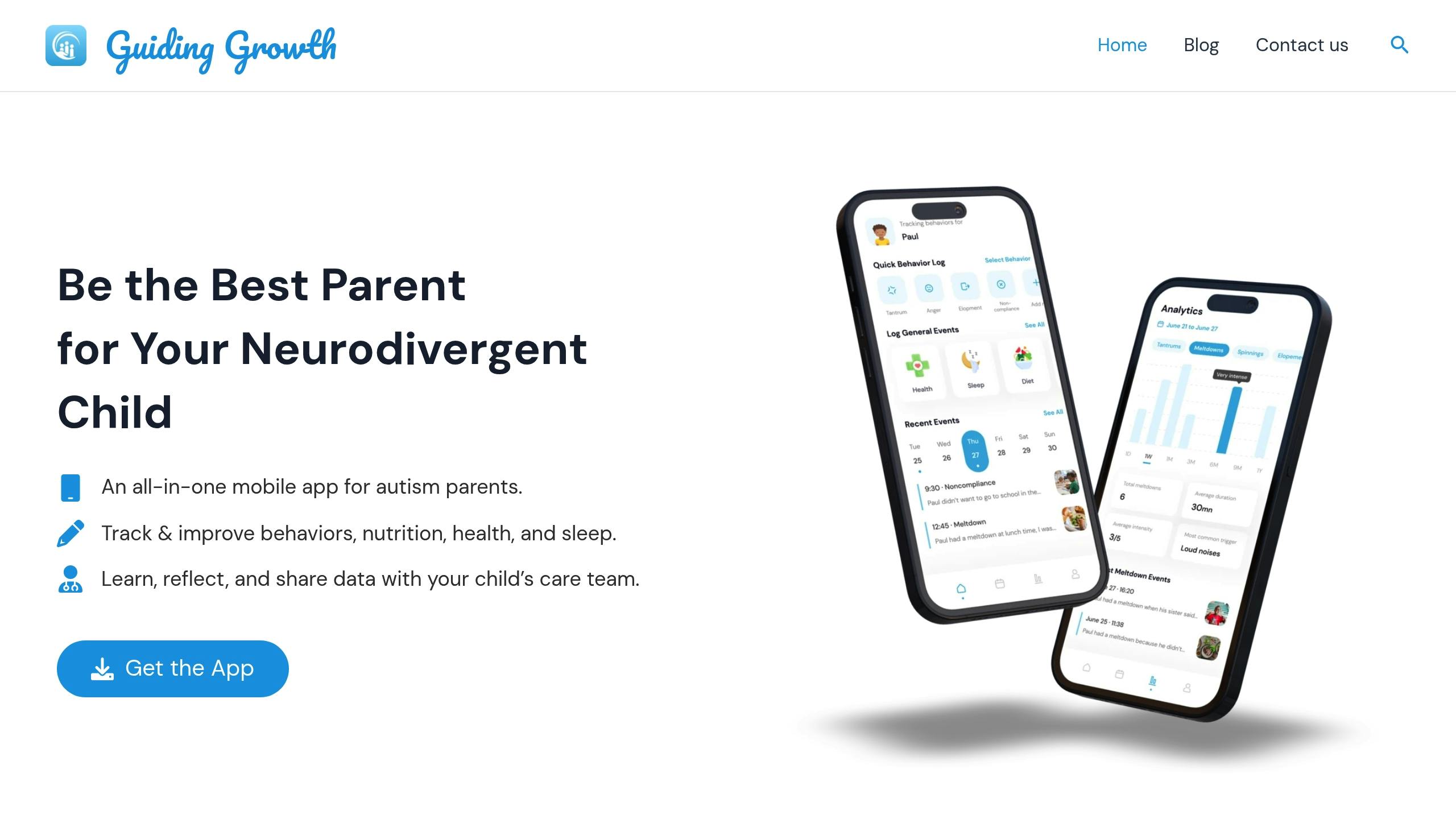Stimming, or self-stimulatory behavior, is common in autism and can include repetitive actions like hand flapping or repeating words. While often harmless, it may sometimes interfere with daily life. This guide explores how supplements, alongside other strategies, might help manage stimming by addressing potential nutrient deficiencies.
Key Takeaways:
-
Supplements to Consider:
- Omega-3 Fatty Acids: Supports brain function and focus.
- Vitamin B6 & Magnesium: Helps regulate the nervous system.
- Probiotics: Improves gut health, which may influence behavior.
- N-Acetylcysteine (NAC): Reduces oxidative stress and regulates brain chemicals.
- Tracking Progress: Use tools like the Guiding Growth app to monitor stimming patterns, supplement effects, and triggers.
- Other Strategies: Sensory therapy and adjusting the environment can also help manage stimming behaviors.
How to Start:
- Consult a Doctor: Get medical advice before starting supplements.
- Track Changes: Monitor stimming, sleep, and mood over time.
- Combine Approaches: Pair supplements with sensory and behavioral strategies for the best results.
This guide provides practical steps to safely explore supplements as part of a broader plan to support children with autism.
5 Essential Supplements for Supporting Autism Management
Top Supplements That May Help With Stimming
Some research suggests that certain supplements may support brain health and potentially reduce stimming behaviors. When used alongside other autism support strategies, these supplements could play a helpful role.
Omega-3 Fatty Acids
Omega-3s, specifically DHA and EPA, are known to support brain function and development. They help nerve cells communicate, reduce inflammation, and improve focus. These benefits may contribute to managing stimming behaviors.
Vitamin B6 and Magnesium
This duo plays a role in regulating the nervous system. Vitamin B6 aids neurotransmitter production, while magnesium helps with stress balance. It’s important to introduce these supplements gradually and consult a healthcare provider for guidance.
Probiotics for Gut Health
The gut-brain connection highlights the role of probiotics in behavior and overall health. Probiotics can improve digestion, reduce inflammation, and enhance nutrient absorption.
N-Acetylcysteine (NAC)
NAC, an antioxidant, helps regulate glutamate levels in the brain, reduces oxidative stress, and supports detoxification. These effects may influence the frequency and intensity of stimming behaviors.
sbb-itb-d549f5b
Starting a Safe Supplement Program
Here’s how to establish a safe and effective supplement plan for your child.
Working With Your Doctor
Always consult your child’s doctor before introducing any supplements. Share a detailed list of current medications, therapies, allergies, targeted stimming behaviors, and any past experiences with supplements. Your doctor might run baseline tests to check for deficiencies and ensure the supplements are safe. They’ll also help you figure out the right dosages and flag any possible interactions with medications. Once a plan is in place, keep a close eye on how your child responds.
Monitoring Results and Making Adjustments
Keep track of changes in stimming behavior, sleep quality, appetite, digestion, mood, and any unexpected side effects. Maintain a log of when supplements are given and their effects. Start with one supplement at a time, sticking to the same dose for 3-4 weeks before making any changes. This method makes it easier to pinpoint what works. Detailed notes will help you refine the plan and provide valuable information for future doctor visits.
Using Guiding Growth to Track Progress

The Guiding Growth app can simplify tracking and adjustments. It allows you to:
- Log supplement doses and times
- Record stimming episodes and possible triggers
- Monitor sleep and dietary changes
- Generate reports to share with your doctor
If multiple caregivers are involved, they can all add observations, giving a more comprehensive view of how the supplements are affecting your child throughout the day. These insights can help your healthcare provider make better-informed decisions about the supplement plan.
Other Ways to Help Manage Stimming
Sensory Therapy
Sensory Integration Therapy (SIT) can assist children in handling sensory input, which may help lessen stimming behaviors. At home, you can try activities like:
- Using weighted blankets or compression clothing for deep pressure
- Encouraging climbing, jumping, or pushing to provide proprioceptive input
- Introducing swings or balance equipment for vestibular stimulation
- Exploring various textures to create tactile experiences
These sensory-focused strategies, combined with adjustments to behavior and surroundings, can create a supportive environment for managing stimming.
Behavior and Environment Tips
Identify environmental triggers by using tools like Guiding Growth. Keep in mind that some stimming behaviors help with self-regulation. Focus on adjusting only those that interfere with daily life.
Summary and Next Steps
Managing stimming behaviors with supplements requires careful planning, medical guidance, and consistent tracking to achieve the best results.
Important Things to Know About Supplements
When using supplements to address stimming behaviors, keep these key points in mind:
- Work with a healthcare provider: Always consult your child’s doctor before starting any supplement routine.
- Responses differ: Each child may react differently. Monitoring both the effects and any side effects is critical to understanding what works.
- Use a combined approach: Supplements are most effective when paired with other strategies like sensory therapy, changes to the environment, and dietary adjustments.
Use tools that simplify tracking and decision-making to make this process smoother.
How Guiding Growth Can Help
The Guiding Growth app enhances your ability to track supplement use, stimming patterns, diet, and sleep. By keeping all this information in one place, it not only helps you stay organized but also improves communication with your child’s healthcare team.


